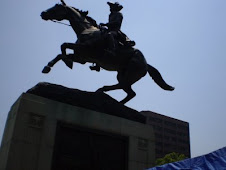I heart Rudy
Here's why:
He is a Conservative when it counts: i.e., when he is in charge.
[I]t was astonishing how fully he followed through on his conservative principles once elected, no matter how much he upset elite opinion, no matter how often radical advocates took to the streets in protest, no matter how many veiled (and not so veiled) threats that incendiary figures like Al Sharpton made against him, and no matter how often the New York Times fulminated against his policies. In particular, offended by the notion that people should be treated differently and demand privileges based on the color of their skin, Giuliani was fearless in confronting racial extortionists like Sharpton. Early in his tenure, he startled the city when he refused to meet with Sharpton and other black activists after a confrontation between police and black Muslims at a Harlem mosque.
He respects the rule of law:
For Giuliani, the revival of New York started with securing public safety, because all other agendas were useless if citizens didn’t feel protected. “The most fundamental of civil rights is the guarantee that government can give you a reasonable degree of safety,” Giuliani said. He aimed to do so by reinstituting respect for the law. As a federal prosecutor in New York in the 1980s, he had vigorously hunted low-level drug dealers—whom other law enforcement agencies ignored—because he thought that the brazen selling of drugs on street corners cultivated disrespect for the law and encouraged criminality. “You have to . . . dispel cynicism about law enforcement by showing we treat everyone alike, whether you are a major criminal or a low-level drug pusher,” Giuliani explained.
He speaks straightforwardly:
“Seventy percent of long-term prisoners and 75 percent of adolescents charged with murder grew up without fathers,” Giuliani told the city. He insisted that the city and the nation had to reestablish the “responsibility that accompanies bringing a child into the world,” and to that end he required deadbeat fathers either to find a private-sector job or to work in the city’s workfare program as a way of contributing to their child’s upbringing. But he added that changing society’s attitude toward marriage was more important than anything government could do: “[I]f you wanted a social program that would really save these kids, . . . I guess the social program would be called fatherhood.”
He understands the GWOT, which he saw up close and personal:
Like great wartime leaders, Giuliani displayed unflinching courage on 9/11. A minute after the first plane struck, he rushed downtown, arriving at the World Trade Center just after the second plane hit the South Tower, when it became obvious to everyone that New York was under attack. Fearing that more strikes were on the way—and without access to City Hall, the police department, or the city’s command center because of damage from the attacks—Giuliani hurried to reestablish city government, narrowly escaping death himself as the towers came down next to a temporary command post he had set up in lower Manhattan. “There is no playbook for a mayor on how to organize city government when you are standing on a street covered by dust from the city’s worst calamity,” one of his deputy mayors, Anthony Coles, later observed.
I don't care about his private life, or his opinions on abortion or guns. I want someone at the helm who understands what danger our nation is in and is determined to do something about it.











No comments:
Post a Comment